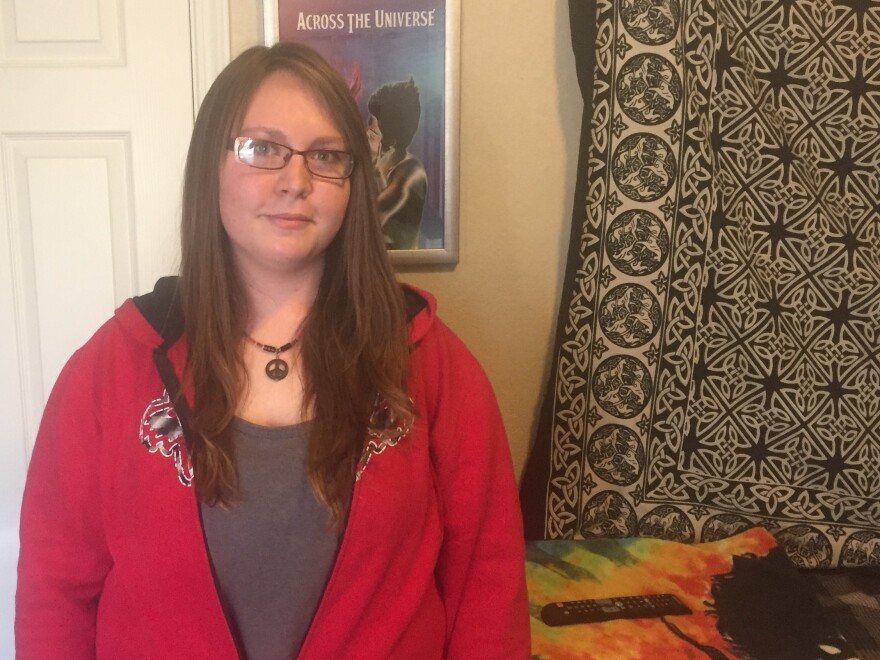Pocatello, Idaho, and Laramie, Wyo., might not be the first places you think of leading the charge to protect the LGBT community from discrimination. But in these rural, Republican-led states, local governments are taking the matter into their own hands.
Twenty-year-old college student CylieAnn Erickson was in the room when the city council in Laramie passed its LGBT anti-discrimination bill earlier this year. She says that when the final vote was counted, she breathed a sigh of relief.
"So I don't have to ... like have that in the back of my mind, like oh, this isn't going to be why I'm fired. If I'm fired, it's going to be because I'm doing a bad job," Erickson says.
The ordinance bans discrimination against LGBT people in employment, housing and public accommodations like bars and restaurants. It has extra meaning because just a few months earlier, the Wyoming State Legislature voted down a bill that would have done the same statewide.
Erickson is gay, and says she now feels more secure at her job at a local hardware store.
"I was just so excited when they were like well, this is it. It's official," she says.
Laramie is one of a growing number of cities and counties that have passed their own measures to protect gay and lesbian people. Here in Wyoming, and in other conservative-led states like Florida and Idaho, state-level bills meant to protect LGBT people have been repeatedly voted down, or stalled out in committee.
"The state didn't pass it. We were hoping the state would. They didn't. So we felt like there was a need for us to do it," Paul Weaver, Laramie City Council Representative, says.
Weaver says the fact that Laramie is a college town — a blue dot in a red state — helped get the city ordinance passed after the state bill went down. Dozens of local businesses signed a petition in favor of the ordinance, and each time it was debated, Weaver says city hall was packed.

"There were some personal accounts related that dealt with some of the difficulties people had with not having this protection afforded to them. It was powerful to hear those! It helps you make that personal connection," Weaver says.
That connection can be incredibly important when pushing for change.
"We know that people grow to support LGBT equality when they know LGBT people," Jeremy Pittman, who works for a national LGBT advocacy group, Human Rights Campaign, says.
He says his group have been focusing on getting local level ordinances passed in places like Laramie where statewide efforts have failed. Right now the Human Rights Campaign's largest local fronts are Jacksonville, Fla., Charlotte, N.C., and Houston, Texas.
But Pittman says even if those cities pass protections, it won't be enough.
"The patchwork of protection that exists today provides a strong level of protection in some cities and in some states. But that is simply not good enough. It shouldn't matter where you live, as to whether you are going to be protected against discrimination," Pittman says.
And in some places, these local level protections are under fire. In the last few years, Tennessee and Arkansas have both passed state laws banning local governments from protecting classes of people not already covered by state law — which means no protections for LGBT people.
"The purpose is just to protect our businesses," Bart Hester, an Arkansas state senator, says. He's the lead sponsor of the state's bill.
We didn't want — if you are a small franchisee and you had a fast food restaurant or gas station in four or five different cities — to have different civil rights laws to be concerned with in each city.
"Look, if someone is the best person for the job, they need to get the job," he says.
Hester was motivated to introduce his bill this year after some cities in Arkansas passed local ordinances much like Laramie's. He says if every local government in the state was allowed to do the same, businesses would be facing a red tape nightmare.
"We didn't want --if you are a small franchisee and you had a fast food restaurant or gas station in four or five different cities — to have different civil rights laws to be concerned with in each city," Hester says.
Those questions would get a lot clearer if the U.S. Congress passes a bill banning discrimination on the basis of sexual orientation or gender identity. The Equality Act, a bill that would do just that, was introduced this year, but the current Congress is unlikely to pass it.
Copyright 2015 Wyoming Public Radio



